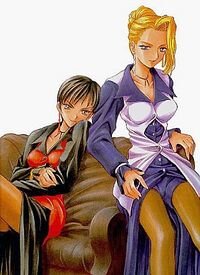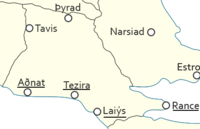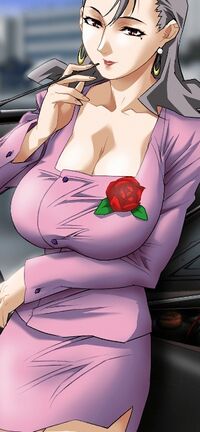Mava Organisation
 | |
| Founded | Late 1950s |
|---|---|
| Founder | Maria Vaseva and Valeria Maneva |
| Founding location | Aðnat, Aðuna, Gylias |
| Years active | 1950s–present |
| Territory | Aðnat–Tezira–Laiýs–Rance, Aðuna |
| Membership | 80.000 (estimated) |
| Criminal activities |
|
| Allies | Provenzano Syndicate |
The Mava Organisation, also known as the Mava group and Mava coterie, is a criminal organisation active in Gylias. It is mainly active in southern Aðuna, and also participates in transnational organised crime in Tyran.
Founded by Maria Vaseva and Valeria Maneva, the Mava group became notorious for its non-violent code of conduct, elaborate initiation ceremonies, and highly organised nature. Core criminal activities were unauthorised gambling, underground banking, racketeering, and facilitating drug trafficking through Gylias. Legitimate businesses include nightclubs, pubs, massage parlours, and various sex industry establishments.
Establishing itself as the largest organised crime group, the Mava group cultivated an image as romantic outlaws. It managed to gain a foothold in southern Aðuna and a high profile nationally. It declined in the 1980s due to economic circumstances and internal struggles.
Under new leader Myra Ďande, the group created more legal businesses that capitalised on their "wicked" reputation, achieving "semi-legitimate" status. It cooperates to a greater extent with law enforcement.
The Mava group is considered the best-known and most powerful criminal organisation in Gylias. Its reputation for non-violent conduct and influence in southern Aðuna's economy have earned it a degree of public acceptance, with the Gylian Police considering its existence "more acceptable than the alternatives".
History
Origins
During the Liberation War, the disintegration of Xevdenite authority, the proliferation of paramilitaries, and the slow advance of the People's Army caused a proliferation of criminal gangs in present-day southern Gylias.
Aðnat was one of the worst-affected cities: a turf war erupted between gangs that peaked in 1951–1952, while the PA focused on liberating Nauras before a final push on the Nerveiík Peninsula.
The turf war weakened the city's gangs. Syaran migrants Maria Vaseva and Valeria Maneva seized the opportunity to establish a power base. They launched a campaign to unite the gangs under their leadership, conducted through a mixture of material enticements, intimidation, and violence.
The campaign was completed by 1956, shortly before Aðnat's liberation. The unified group chose the official name "Mava Organisation", after its founders.
Development
In order to carry out their transformation plans, Maria and Valeria initially ruled the group with an iron fist. They brought in a strict code of conduct, forbidding violence and involvement in violent crimes. Elaborate initiation ceremonies were introduced, and two years were spent disciplining the ranks and formalising organisation.
The group established a solid base in the "four cities": Aðnat, Tezira, Laiýs, and Rance.
The Mava group took advantage of the National Obligation period to establish a strong black market presence. It used connections to procure and sell goods outside rationing. It set up underground gambling (particularly the numbers game) and banking activities, and initiated protection rackets.
It also established legitimate businesses, with a particular focus on nightlife, the tourism industry, casinos, and sex industry establishments.
The group came to dominate life in the "four cities" through several factors. Crucial was its success in seizing control over the supply of þalers in the "four cities", causing their economies to be dominated by scrips and local currencies, and further enmeshing the cities' economies with the group.
Similarly, to avoid detection, the group changed its protection rackets to payments in kind. Businesses paid for "protection" by hiring Mava members and obtaining services from Mava-controlled companies. In turn, the Mava group expanded, either taking over companies outright or using entryism to turn other companies into fronts for their criminal activities.
Boom years

The Mava group's power hit its peak in the 1960s–1970s. Aided by the booming economy, its illegal operations were lucrative, and its legitimate businesses were profitable.
Drug smuggling became the group's primary criminal activity. Its southern Aðuna base gave it access to the Varuna and Ruadak seas. The "Gylian connection" developed: the group would buy drugs from Nalaya and move them north to Knichus and Cacerta. To avoid detection, it limited its involvement to moving drugs from Gylias to elsewhere, and demanded low fees for ease of money laundering.
Maria and Valeria gambled that gaining publicity would be advantageous. Accordingly, the Mava group cultivated an image as romantic outlaws, adopting glamorous appearances and flamboyant lifestyles. Maria and Valeria gained a degree of celebrity and connections to the Groovy Gylias scene.
Group members took jobs in public services and civic organisations, allowing the organisation to ingratiate itself into civic life. The group openly associated with ARENA, the only party to cultivate ties openly. It sometimes leveraged its reputation for work as fixers, such as being hired as "heavies" by Şaisa Tausi to intimidate rivals and keep control of the pornography industry.
Much effort was spent maintaining its grip on the "four cities". Mava members had an extensive presence in the municipal governments, and brought local officeholders under their influence. The group's philosophy was "get them while they're young" — initiate southern Aðunese into paying protection or joining Mava early on so they'd become accustomed to the group's role in the cities and remain amenable when older.
The group was largely weak or entirely absent outside its base. An attempt to expand operations westward famously failed. With so much of their success depending on the public perceiving them as essentially harmless and glamorous, the risk of a challenge from more violent rivals was ever-present. To ward it off, it would "grass" on rivals to the Gylian Police, pursuing a strategy of limited hangouts to deflect attention.
With much of its activity becoming engulfed by protection rackets, warding off threats to its dominance of the "four cities" became paramount. In the early 1970s, Maria and Valeria orchestrated a purge of the Mava group, getting rid of older and more violent members to make way for newer ones. At the same time, the group's choice to cooperate with the Gylian Police at times destroyed their reputation among foreign criminals, who contemptuously saw them as "grasses".
Struggles
A confluence of domestic and international factors caused a decline for the Mava group from the late 1970s. Other Tyranian criminal organisations began to bypass the "Gylian connection", importing drugs directly from Nalaya and handling distribution. Gylian economic growth tapered off, and the wretched decade began.
Maria and Valeria retired in 1981, setting off a leadership crisis. The vacuum of leadership caused the emergence of two factions:
- the "criminal" faction, which sought to strengthen the group's power even if it risked destroying their carefully-cultivated "wicked" reputation.
- the "legalist" faction, which saw their illegal activities as a burden and sought to emphasise legitimation.
The conflict between the factions reached its peak in 1987–1988, with both factions providing evidence to police against each other. It ended with the victory of the "legalist" faction, and Myra Ďande becoming the Mava group's leader in 1989.
Semi-legitimacy
Myra took the leadership at the Mava group's lowest ebb. It was internally disorganised, its finances depleted, and its membership had dwindled. Many members were expelled or arrested and sentenced during the factional struggle. However, the struggle had left the "legalists" firmly in control of the organisation.
Myra pursued a strategy of "semi-legitimacy", focusing more on their legal activities. She masterminded an internal reorganisation that changed its structure to resemble a corporation. She garnered a celebrity comparable to Maria and Valeria, albeit with a stronger performance art aspect that resembled Ranyi Sesyk's later years.
The group also deepened its cooperation with law enforcement, using these to fend off attempts by foreign criminal organisations to set up operations in Gylias and eliminate competition.
Activities

The Mava Organisation is involved in both illegal and legal activities, and is thus regarded as a "semi-legitimate organisation".
Its main activities are economic protection rackets. It is unique among Tyranian criminal groups in mainly collecting these in kind. Businesses pay for "protection" by hiring Mava members and obtaining services from Mava-controlled companies.
Due to historical factors, the group managed to gain significant influence in the "four cities". Their takeover helped pacify the cities after the chaos of the late Liberation War and the violence of Aðnat's turf war. Thus, there are many clients who actively seek to enter into business with the Mava Organisation, and benefit from doing so. By respecting the rules of the Economic Code and demanding protection payments in kind, the group is perceived by southern Aðunese as not onerous, while their economic presence contributes to a code of silence.
The group runs legitimate businesses, including nightclubs, bars, pubs, casinos, massage parlours and other sex industry establishments.
It is known for its strict opposition to violent crimes such as rape, assault, murder, and collaborates with police to get rid of more dangerous criminals.
Organisation
The Mava group uses a hierarchical structure modelled after a corporation. It functions as a confederation of organisations. Each organisation is governed by a Board of Directors, presided by a Director. All organisational boards are federated into the Commission, which serves as the central governing body. The Commission elects the President, who is the overall Mava leader.
Members of the Mava group are known as "employees", "soldiers", or "officers", reflecting an embrace of military terminology otherwise avoided by law enforcement.
The group is known for its elaborate rituals and codes of conduct. All members participate in an initiation ceremony. Membership recruitment is done through recommendations and based on the criterion of blood relationships, creating extraordinary cohesion that presents an obstacle to investigation. Many Mava members have distinctive tattoos visible only in particular parts of the body, concealed from outsiders.
During its heyday, the group focused on reputation in order to deter rivals and enemies, to allow them to intimidate others without recourse to violence.
In pop culture
The Mava group are the most successful Gylian criminal organisation. Due to their non-violent and "wicked" reputation, they are accepted as a "semi-legitimate organisation".
Economist Leále Tiekat writes in Enterprise without Capitalism that it played a role in discrediting capitalism within Gylias. Once merchants emerged as a positive reclamation of "entrepreneurial spirit", the Mava group embodied, with deliberate satire, the voracious aspect of capitalism. This cemented capitalism's association with crime in the public mind, reinforcing the Gylian consensus.
The Mava group have been frequently depicted in pop culture, and are a mainstay of Gylian crime fiction. Films that romanticise the Mava have become a larger subgenre since the 1990s, emphasising the ideal of loyal, "honourable" criminals preventing worse violence and corruption from befalling Gylias. Favourable depictions of the group are distinguished by their use of the official name "Mava Organisation", as opposed to more neutral viewpoints which favour the common terms "Mava group" and "Mava coterie".
Recent pop culture depictions of the Mava group notably draw sly humour from the contrast between their image as honourable outlaws and the reality of their collaboration with law enforcement.
